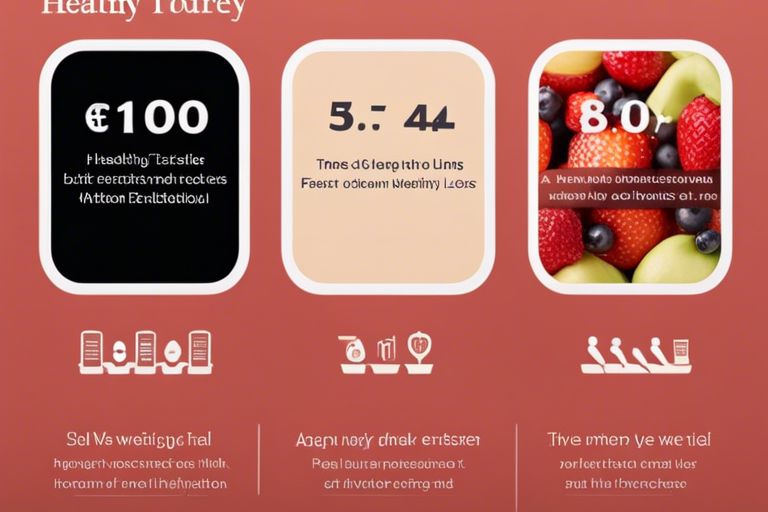Many individuals are eager to shed those extra pounds quickly and effectively. When begining on a weight loss journey, it is crucial to prioritize safety and sustainability. The key to lasting weight success lies in aiming for a steady drop of 1 to 2 pounds each week. By following a method that is both safe and sustainable, you can achieve your weight loss goals without compromising your health.
Choosing the right approach to weight loss can be a daunting task, with numerous diet plans promising quick results. However, many of these plans can leave you feeling hungry and unsatisfied. The secret to successful weight loss lies in focusing on curbing cravings, accelerating weight loss results, and boosting overall metabolic wellness. By following these 3 simple steps, you can achieve your weight loss goals effectively while feeling satiated and energized.
By adopting a diet rich in whole foods and potentially lower in carbs, you can fuel your weight loss journey while enjoying nutritious and satisfying meals. Whether you choose to cut down on refined carbs or opt for a balanced low-carb approach, these strategies can help you achieve your weight loss goals. Keep in mind, it’s not just about losing weight quickly; it’s about making sustainable lifestyle changes that promote long-term health and well-being.
Types of Weight Loss Approaches
For a successful weight loss journey, it’s important to consider different approaches that can help you achieve your goals. There are various methods to shed pounds swiftly, including Low-Carb Diets, Low-Fat Diets, Calorie-Counting Diets, and Meal Replacement Strategies. Recognizing the differences between these approaches can help you tailor a plan that suits your lifestyle and preferences.
| Low-Carb Diets | Low-Fat Diets |
| Focuses on reducing carbohydrate intake to promote fat burning for energy. | Emphasizes reducing fat consumption to lower overall calorie intake. |
| Can lead to rapid weight loss by curbing hunger and promoting fat metabolism. | May help reduce calorie intake and lead to weight loss over time. |
| Some research suggests that low-carb diets can improve metabolic health markers. | Low-fat diets are often recommended for individuals with specific health conditions. |
Low-Carb Diets
There’s a growing body of evidence supporting the effectiveness of low-carb diets for weight loss. By reducing your intake of refined carbs and focusing on whole foods, you can experience significant decreases in hunger and cravings. This approach can lead to a shift in the body’s energy source from carbohydrates to stored fat, resulting in accelerated weight loss. While low-carb diets have shown promising results in short-term studies, the long-term effects and sustainability of this approach may vary among individuals.
Low-Fat Diets
On the other hand, low-fat diets focus on reducing fat intake to create a calorie deficit for weight loss. By emphasizing lean protein sources, fruits, and vegetables, you can limit overall calorie consumption and promote gradual weight loss. Low-fat diets are often recommended for individuals looking to manage conditions such as high cholesterol or heart disease. While this approach may not lead to rapid weight loss compared to low-carb diets, it can be a sustainable option for long-term health and wellness goals.
Loss
Dietary strategies that emphasize calorie counting involve tracking your daily energy intake to create a deficit for weight loss. By monitoring the number of calories consumed and burned through physical activity, you can effectively manage your weight. Calorie-counting diets can be personalized to fit individual needs and preferences, making them a versatile option for those looking to lose weight. It’s important to seek guidance from a healthcare provider or nutritionist when begining on a calorie-counting diet to ensure a balanced approach that supports overall health.
Diets
In addition to traditional weight loss methods, meal replacement strategies offer a convenient and structured approach to managing calorie intake. By substituting one or two meals a day with nutrient-dense shakes or bars, you can control portions and reduce overall calorie consumption. Meal replacement options can be effective for individuals seeking a simple and convenient way to limit calories and promote weight loss. However, it’s important to choose meal replacement products that provide adequate nutrition and support your overall health goals.
Diet
Preparing for Weight Loss
Setting Realistic Goals
Keep in mind that commenceing on a weight loss journey requires setting realistic goals. Assuming you want to shed those extra pounds swiftly, it’s important to establish achievable targets. Rapid weight loss can be appealing, but sustainable results come from steady progress. Aim for a gradual drop of 1 to 2 pounds per week, as this is the golden ticket to lasting success. By setting realistic goals, you set yourself up for long-term weight management.
Understanding Basal Metabolic Rate (BMR)
Even before venturing into a weight loss plan, it’s crucial to understand your Basal Metabolic Rate (BMR). This measurement signifies the minimum amount of energy your body requires to function at rest. By comprehending your BMR, you gain insight into the number of calories you need each day.Preparing a weight loss strategy that aligns with your BMR ensures you’re fueling your body adequately while creating a calorie deficit for weight loss.
When designing your personalized weight loss plan, consider factors such as your activity level, age, weight, and height. By tailoring your approach to your individual needs, you can maximize the effectiveness of your weight loss journey. For optimal results, consult with a healthcare professional or a nutritionist to create a plan that is safe and sustainable in the long run.

Step-by-Step Guide to Starting Your Weight Loss Journey
|
Step 1: Assessing Dietary Habits
If you’re ready to start your weight loss journey, the first step is to assess your current dietary habits. Take a close look at what you typically eat throughout the day. Are there areas where you can cut back on unhealthy foods and replace them with more nutritious options? Keep track of your meals and snacks to get a clear picture of your eating patterns. Consider consulting a healthcare professional or nutritionist to help you evaluate your diet and make necessary changes. They can provide valuable insights and personalized recommendations based on your individual needs and goals. By addressing your dietary habits upfront, you can set a strong foundation for successful weight loss. Monitoring your food intake and making mindful choices can lead to significant improvements in your overall health and well-being. Note, small changes can make a big difference in the long run, so take the time to assess and adjust your diet accordingly. |
Step 2: Building a Nutritious Meal Plan
An necessary aspect of your weight loss journey is building a nutritious meal plan that aligns with your goals. Start by incorporating a variety of whole foods, lean proteins, healthy fats, and vegetables into your daily meals. Balance is key when it comes to creating a sustainable and satisfying eating routine.Your meal plan should be tailored to your specific needs and preferences. Focus on including nutrient-dense foods that provide necessary vitamins, minerals, and antioxidants. Experiment with different recipes and ingredients to keep your meals interesting and enjoyable. Planning ahead and preparing meals in advance can also help you stay on track with your weight loss goals. Your dietary choices play a significant role in your weight loss journey. By prioritizing whole, nourishing foods and structuring your meals effectively, you can optimize your nutrient intake and support your overall well-being. Remember to listen to your body’s hunger and fullness cues and adjust your meal plan accordingly. |
Step 3: Incorporating Physical Activity
Building regular physical activity into your routine is crucial for boosting weight loss results and enhancing your overall health. Whether you prefer cardio workouts, strength training, or a combination of both, finding activities you enjoy is key to staying motivated and consistent. Aim to engage in exercise at least a few times a week to support your weight loss efforts.For instance, brisk walking, jogging, cycling, or swimming are fantastic options for burning calories and improving cardiovascular fitness. Incorporating strength training exercises, such as weightlifting, can help increase muscle mass and metabolism. Make physical activity a priority in your daily schedule to maximize the benefits for your weight loss journey. |
Weight Loss Tips for Success
Unlike fad diets or extreme measures, sustainable weight loss is achievable through healthy and balanced practices. Here are key tips to help you reach your weight loss goals:
- Mindful Eating Practices: Weight loss goes beyond just what you eat; it’s also about how you eat. Implement portion control and mindful eating practices to avoid overeating and improve digestion. Chew your food thoroughly, eat slowly, and savor each bite to feel satisfied with smaller portions. Knowing when you’re full and stopping eating at that point can prevent consuming excess calories.
Mindful Eating Practices
Weight loss isn’t just about the food you consume but also about how you consume it. Implementing mindful eating practices can help you build a healthier relationship with food and prevent overeating. By focusing on your meals, savoring each bite, and listening to your body’s hunger cues, you can avoid mindless eating and better control your calorie intake. Creating a mindful eating environment, free from distractions, can further enhance your awareness of food consumption and promote weight loss.
Additionally, practicing gratitude for your meals and being present during eating can help you appreciate the nourishment your body receives. Mindful eating is a powerful tool in weight management that can lead to long-term success in maintaining a healthy weight and lifestyle.
Hydration and Its Role in Weight Management
With hydration playing a crucial role in weight management, staying well-hydrated is vital for supporting your weight loss journey. Drinking an adequate amount of water not only helps keep you hydrated but can also aid in appetite control and calorie regulation. Since thirst can often be mistaken for hunger, ensuring proper hydration levels can prevent unnecessary snacking and overeating.
Management of your body’s fluid balance is key in supporting various metabolic functions, including fat metabolism and toxin elimination. Drinking enough water throughout the day can boost your metabolism and help your body efficiently burn calories. Incorporating hydrating foods like fruits and vegetables can also contribute to your overall fluid intake and weight management efforts.
Importance of Sleep in Weight Loss
Some studies suggest that quality sleep is closely linked to weight loss and overall health. Proper sleep duration and quality sleep patterns play a significant role in regulating hunger hormones and metabolic processes. Getting enough rest can help support your body’s weight management efforts by reducing cravings, improving energy levels, and enhancing physical performance.
Tips for optimizing your sleep to aid in weight loss include maintaining a consistent bedtime routine, creating a relaxing sleep environment, and prioritizing restful sleep each night. By recognizing the importance of sleep in your weight loss journey, you can establish healthy sleep habits that support your overall well-being and weight management goals.
Factors Affecting Weight Loss
Despite calorie deficit being the key to weight loss, several factors can influence the rate and success of shedding those extra pounds. Genetic predispositions, hormonal influences, and environmental lifestyle factors all play a significant role in an individual’s weight loss journey.
Genetic Predispositions
Even with a strict diet and exercise routine, genetics can heavily impact how quickly or easily someone loses weight. Genetic variations can influence metabolism, fat storage, and even food preferences, making weight loss efforts more challenging for some individuals.
Recognizing the role of genetics in weight loss can help tailor a personalized approach, focusing on strategies that work best for an individual’s unique genetic makeup. While genetics may present obstacles, a consistent effort towards healthy habits can still lead to successful weight loss outcomes.
Hormonal Influences
To achieve successful weight loss, hormonal balance is crucial. Hormones like insulin, leptin, and cortisol play crucial roles in regulating appetite, metabolism, and fat storage in the body. Imbalances in these hormones can hinder weight loss efforts, making it harder to shed pounds.
A comprehensive understanding of how hormones impact weight loss can guide individuals in making informed choices about their diet, exercise, and lifestyle habits. Balancing hormones through proper nutrition, stress management, and adequate sleep can optimize weight loss results.
Aiming for hormonal harmony can support overall health and well-being, facilitating a more effective and sustainable weight loss journey.
Environmental and Lifestyle Factors
Despite genetic and hormonal influences, external factors like diet, exercise, stress levels, and sleep patterns also play a significant role in weight loss. An individual’s environment and lifestyle choices can either support or hinder their weight loss efforts.
- Choosing nutrient-dense foods and engaging in regular physical activity can promote weight loss.
- Managing stress levels and prioritizing quality sleep are also crucial for optimal weight management.
After addressing environmental and lifestyle factors, individuals can create a conducive environment for successful weight loss, enhancing their overall well-being in the process.
Hormonal imbalances caused by factors like chronic stress, inadequate sleep, and poor dietary choices can disrupt weight loss efforts. Balancing these hormonal influences through lifestyle modifications can support sustainable weight loss and improved health outcomes.
- Factors such as sedentary behavior, processed food consumption, and inadequate hydration can impede weight loss progress.
- After recognizing and addressing these environmental and lifestyle factors, individuals can optimize their weight loss journey for long-term success.

Understanding Metabolism and Its Impact on Weight Loss
What is Metabolism?
Your metabolism is the process by which your body converts what you eat and drink into energy. It is a crucial factor in determining how many calories your body burns each day. The faster your metabolism, the more calories you burn, even at rest. Some people naturally have a faster metabolism than others, while factors such as age, gender, and body composition also play a role in determining metabolic rate. It’s imperative to understand your metabolism and how it impacts your weight loss journey.
How to Boost Metabolism
The key to boosting your metabolism lies in making specific lifestyle changes and incorporating certain strategies into your daily routine. Some effective ways to boost metabolism include engaging in regular physical activity such as strength training and cardio exercises. Strength training helps build muscle mass, which can increase your resting metabolic rate over time. Including protein-rich foods in your diet can also help boost metabolism, as protein requires more energy to digest than fats or carbs.
Another effective way to boost metabolism is by staying hydrated. Drinking enough water can help increase your metabolic rate, as dehydration can slow down your body’s ability to burn calories. Additionally, getting an adequate amount of sleep is crucial for maintaining a healthy metabolism. Lack of sleep can disrupt your body’s hormonal balance, leading to a decrease in metabolic function.
Pros and Cons of Popular Weight Loss Methods
| Low-Carb Diets | Calorie-Counting Diets |
|
To shed those extra pounds? When your healthcare expert gives the green light, it’s crucial to choose a method that’s both safe and sustainable. Aiming for a steady drop of 1 to 2 pounds each week is the golden ticket to lasting weight success. |
If you’re leaning towards complex carbs like whole grains and combining it with a calorie deficit, there’s a bonus. These grains pack more fiber and release energy slowly. So, every bite keeps you full and contented for longer. |
Low-Carb Diets
To shed those extra pounds? When your healthcare expert gives the green light, it’s crucial to choose a method that’s both safe and sustainable. Aiming for a steady drop of 1 to 2 pounds each week is the golden ticket to lasting weight success.
Embracing diets rich in whole foods and perhaps on the lower carb side can not only fuel weight loss but also feel satisfying. Curbing those cravings, accelerating weight loss results, and boosting overall metabolic wellness are key focuses of a low-carb diet.
However, the long-term effects of a strict low-carb lifestyle remain under scrutiny. Sticking to it can be challenging, risking the infamous yo-yo dieting and potentially jeopardizing long-term weight stability.
Calorie-Counting Diets
Popular for their emphasis on portion control and overall calorie intake, calorie-counting diets can be effective for weight loss. By keeping track of the calories consumed, individuals can ensure they are in a calorie deficit, which is necessary for weight loss.
This method allows for flexibility in food choices, as long as the overall calories consumed align with weight loss goals. It also raises awareness about food portions and calorie content, promoting mindful eating habits for long-term weight management.
Fad Diets and Quick-Fix Solutions
While fad diets and quick-fix solutions may promise rapid weight loss, they often fall short in terms of long-term sustainability and overall health benefits. These diets typically focus on extreme restrictions or eliminate entire food groups, which can lead to nutrient deficiencies.
Weight loss achieved through fad diets is often temporary, and individuals may regain the weight once they revert to their previous eating habits. It’s important to be cautious of any diet that promises quick results without considering the impact on overall health and well-being.
Overcoming Obstacles on Your Weight Loss Journey
Plateaus and How to Break Them
Many individuals who commence on a weight loss journey may encounter plateaus where the scale refuses to budge. For some, this can be a frustrating roadblock that dampens motivation. To break through plateaus, consider mixing up your routine by trying new exercises, increasing the intensity of your workouts, or modifying your diet. Small changes can reignite your weight loss progress and keep you moving towards your goals.
Assuming you’ve hit a plateau, remember that patience and persistence are key. It’s important to stay focused on your long-term health and weight loss goals rather than getting discouraged by temporary setbacks. By staying consistent and making gradual adjustments, you can push through plateaus and continue on your path to success.
Dealing with Cravings and Emotional Eating
For many individuals, managing cravings and emotional eating can be major hurdles in their weight loss journey. It’s crucial to develop strategies to cope with these challenges, such as identifying triggers, finding healthier alternatives to high-calorie foods, and practicing mindful eating. By addressing the root causes of cravings and emotional eating, you can better navigate these obstacles and stay on track towards your weight loss goals.
Plateaus Dealing with emotional eating requires a combination of self-awareness and self-control. Understanding your emotional triggers and developing healthier coping mechanisms can help you build a positive relationship with food and avoid turning to it for comfort. By practicing mindfulness and seeking support when needed, you can overcome emotional eating habits and achieve sustainable weight loss.
Staying Motivated During Tough Times
To maintain motivation during challenging periods of your weight loss journey, it’s necessary to set realistic goals, celebrate small victories, and surround yourself with a supportive community. Remember that setbacks are a natural part of any transformative process, and staying focused on your progress rather than perfection can help you stay motivated. By acknowledging your achievements and staying committed to your health and wellness, you can navigate tough times with resilience and determination.
Weight loss is a journey that requires dedication and perseverance. While obstacles like plateaus, cravings, and tough times may arise, approaching them with a positive mindset and proactive strategies can help you overcome them. By staying focused on your goals, staying adaptable in your approach, and seeking support when needed, you can successfully navigate the challenges of your weight loss journey and emerge stronger and healthier on the other side.

Weight Maintenance: Keeping the Pounds Off Long-Term
Transitioning from Weight Loss to Weight Maintenance
Even after achieving your desired weight loss goals, the journey doesn’t end there. It’s important to transition from the phase of active weight loss to a sustainable approach for weight maintenance. This phase involves adopting habits that will help you keep the pounds off in the long term.
Now is the time to focus on creating a balanced lifestyle that includes healthy eating habits, regular physical activity, and mindful choices. By gradually shifting your mindset from a strict weight loss focus to a more holistic approach to wellness, you set yourself up for continued success.
Consistency is key during this phase. Implementing small, sustainable changes over time can lead to significant results in maintaining your weight loss achievements. Note, it’s not just about reaching a number on the scale but about cultivating a healthy relationship with food and exercise for lifelong health.
The Importance of Lifestyle Changes
Now, let’s probe into the importance of lifestyle changes when it comes to weight maintenance. These changes go beyond just following a diet plan; they involve transforming your habits and behaviors to support a healthy weight and overall well-being.
Loss in weight can be maintained through consistent lifestyle adjustments, such as incorporating regular physical activity into your routine, practicing mindful eating, and finding healthy coping mechanisms for stress. These changes contribute to a sustainable approach to weight management and improve overall quality of life.
By prioritizing long-term health over short-term results, you pave the way for a successful weight maintenance journey. Note, sustainable lifestyle changes are the foundation for keeping the pounds off for good.
Recognizing and Managing Triggers
Weight management also involves recognizing and managing triggers that may lead to unhealthy eating habits or setbacks in your weight maintenance journey. Identifying these triggers, whether emotional, environmental, or social, is crucial for long-term success.
Another important aspect of Weight management is developing strategies to cope with these triggers effectively. Whether it’s stress, boredom, or social pressure, having alternative coping mechanisms in place can prevent derailment and help you stay on track with your weight maintenance goals.
Recognizing and managing triggers is a continuous process that requires self-awareness and proactive steps to ensure sustainable weight maintenance. By addressing these triggers head-on, you empower yourself to make healthier choices and maintain your hard-earned progress.
To wrap up
Summing up, the journey to shedding pounds swiftly involves embracing a balanced approach to diet and exercise. By focusing on cutting refined carbs, incorporating protein, healthy fats, and vegetables into meals, and adding in regular physical activity, you can set yourself up for success in achieving your weight loss goals. Bear in mind, it’s not just about rapid results but about sustainable and healthy habits that you can maintain long-term.
While low-carb diets can offer quick weight loss benefits, it’s important to consider the potential long-term effects and consult with a healthcare professional to tailor a plan that works best for you. Whether it’s through calorie cutting or whole food consumption, finding the right balance is key. By following these three simple steps, you can curb cravings, accelerate weight loss, and boost your overall metabolic wellness in a safe and effective manner.
So, take charge of your health, nourish your body with nutrient-rich foods, and move your body regularly. With dedication and consistency, you can achieve your desired weight loss goals and enjoy a healthier, happier lifestyle. Bear in mind, the key is to focus on progress, not perfection, and celebrate each milestone along the way. Here’s to your success in your weight loss journey!


